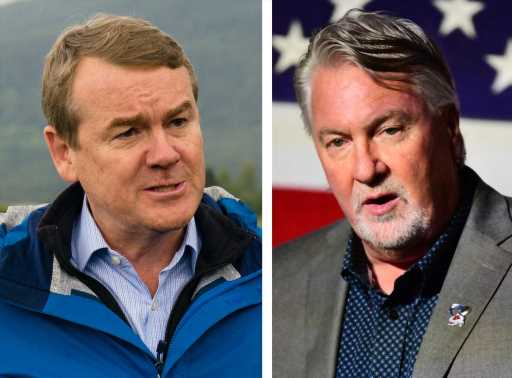Colorado Democratic Sen. Michael Bennet and his challenger, Republican businessman Joe O’Dea, took familiar jabs at each other during a debate Tuesday night, taking shots at each other’s links to national figures and jostling over inflation, energy and foreign policy.
The debate — hosted by Colorado Mesa University in conjunction with Colorado Public Radio and the Grand Junction Daily Sentinel — comes two weeks before Election Day, in a race that Republicans hope will help decide control of the Senate. The meeting followed the final meeting between gubernatorial rivals Gov. Jared Polis and Heidi Ganahl, which has been a more energetic and combative contest than Bennet and O’Dea’s.
Still, the Senate debate underscored enduring differences between the men and the broader party structures that each represent. Here are some of the key moments and takeaways.
Whose leader’s more unpopular?
It’s a midterm election, historically a grim event for the party that sits in the White House. O’Dea sought to exploit that — and the inflation plaguing the country — by linking Bennet to his party’s standard-bearer. Bennet did the same — albeit to a lesser degree — by linking O’Dea to Donald Trump and the “dark vision” Bennet cast him as holding for the nation.
It started from the opening moments, when O’Dea used his opening statement to note that Bennet votes with President Joe Biden 98% of the time. He laid various spending packages — like the COVID relief bill signed as the nation emerged from one pandemic wave and was months away from another — and Biden immigration and foreign policy at Bennet’s feet. As he did at a Republican get-out-the-vote rally Sunday, O’Dea cast his opponent as the deciding vote for Biden’s agenda (a label that could be applied to virtually any Democratic senator, considering the party’s razor-thin majority in the Senate).
“Look, I love my wife dearly, but I don’t even agree with her 98% of the time,” O’Dea said.
In turn, Bennet talked up his own work to pass immigration reform and said O’Dea would’ve supported Trump’s “medieval” border wall. Immigration reform and America’s international standing were both sabotaged by Trump, Bennet said, and the deficit took a blow by tax cuts imposed under his administration — tax cuts O’Dea has said he supports.
“Joe O’Dea voted for Trump twice, knowing how horrendous his immigration policies were,” Bennet said. “He can’t be believed on this issue.”
“Fossil fuels, fossil fuels, fossil fuels”
In response to a question about America’s role in ensuring equitable education for women and girls internationally, O’Dea said America’s economy and the related “war on energy” meant the nation had to step back internationally. It wasn’t the first time he’d linked an issue back to energy, and Bennet pointed it out.
“His answer for everything is fossil fuels, fossil fuels, fuels,” he said.
O’Dea’s argument about energy — from the price of diesel to the issuance of drilling permits in the United States under Biden — was that energy policy was helping to drive inflation in the United States. Natural gas policy could also addressed foreign policy issues like, he argued, the war in Ukraine and concerns about global emissions.
“Even a carpenter like myself can figure out once we move the energy cost down,” he said, “inflation will subside.”
Bennet, unsurprisingly, disagreed. Inflation is a global problem caused by supply chain issues, he said, not one confined to the United States. When O’Dea blamed Biden for setting a date to pull out of Afghanistan, and pivoted from that to saying America needed energy dominance to better influence world affairs, Bennet countered that Trump had set the first date to withdraw from Afghanistan and that America needed to be seen as a leader.
“The world is much more complicated than natural gas,” he said, after O’Dea said energy dominance was the “key to peace in Ukraine.”
Inflation and spending
As Republicans in Colorado and nationally have done for months, O’Dea hammered away at inflation, laying the blame on Bennet and Biden.
He noted Bennet’s support for the $1.9 trillion American Rescue Plan Act, which passed in March 2021 and provided COVID-19-related relief. The pandemic, O’Dea said, had “already subsided,” and the spending “supercharged inflation.” Bennet had been in office for trillions of dollars in spending. And the issue he hears about most frequently from rural Coloradans?
“It’s the cost of diesel,” he said. “‘I can’t fill up my pickup truck. I can’t pay my rent.’”
Beyond noting that inflation was a global problem, Bennet said the COVID-19 relief bill helped stave of evictions and supported local law enforcement (it also came just before the arrival of the first of several new variants of the virus; thousands of Coloradans would die from COVID-19 in the coming months). He hit O’Dea for supporting Trump’s tax cuts, which he called the “biggest waste of money” he’d ever seen.
A broken system
There were moments of agreement: Both men criticized the permitting process for building infrastructure, for instance, and both expressed concern for America’s political system.
O’Dea said he’d worked with Democrats before and had “bucked the party line” before and and would continue to do so, if he’s sent to Washington. He said America’s “party system is broken”; Bennet agreed and said he hadn’t contributed to the “toxic atmosphere” of the Senate, and he pledged not to do so if he’s returned to Washington.
After Bennet spoke about his bipartisan work in the Senate, O’Dea — who answered first — was given 30 seconds for a rebuttal. For the first and only time that evening, he waved it off.
Source: Read Full Article
